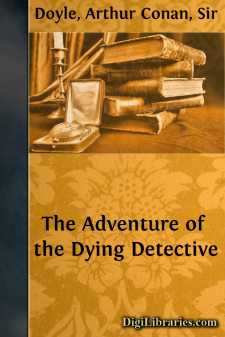Categories
- Antiques & Collectibles 13
- Architecture 36
- Art 48
- Bibles 22
- Biography & Autobiography 813
- Body, Mind & Spirit 142
- Business & Economics 28
- Children's Books 17
- Children's Fiction 14
- Computers 4
- Cooking 94
- Crafts & Hobbies 4
- Drama 346
- Education 46
- Family & Relationships 57
- Fiction 11829
- Games 19
- Gardening 17
- Health & Fitness 34
- History 1377
- House & Home 1
- Humor 147
- Juvenile Fiction 1873
- Juvenile Nonfiction 202
- Language Arts & Disciplines 88
- Law 16
- Literary Collections 686
- Literary Criticism 179
- Mathematics 13
- Medical 41
- Music 40
- Nature 179
- Non-Classifiable 1768
- Performing Arts 7
- Periodicals 1453
- Philosophy 64
- Photography 2
- Poetry 896
- Political Science 203
- Psychology 42
- Reference 154
- Religion 513
- Science 126
- Self-Help 84
- Social Science 81
- Sports & Recreation 34
- Study Aids 3
- Technology & Engineering 59
- Transportation 23
- Travel 463
- True Crime 29
Arthur Conan Doyle
Arthur Conan Doyle was a British writer best known for creating the iconic detective Sherlock Holmes, whose adventures were chronicled in a series of novels and short stories starting with "A Study in Scarlet" in 1887. Born on May 22, 1859, in Edinburgh, Scotland, Doyle was also a physician, which influenced his writing's detail and accuracy in medical matters. Beyond Holmes, he authored historical novels, science fiction, and was a fervent advocate for spiritualism later in life.
Author's Books:
Sort by:
CHAPTER I It has been our fate, among all the innumerable generations of mankind, to face the most frightful calamity that has ever befallen the world. There is a basic fact which cannot be denied, and should not be overlooked. For a most important deduction must immediately follow from it. That deduction is that we, who have borne the pains, shall also learn the lesson which they were intended to...
more...
Chapter 1 The Warning "I am inclined to think—" said I. "I should do so," Sherlock Holmes remarked impatiently. I believe that I am one of the most long-suffering of mortals; but I'll admit that I was annoyed at the sardonic interruption. "Really, Holmes," said I severely, "you are a little trying at times." He was too much absorbed with his own thoughts to give...
more...
Mr. Sherlock Holmes Mr. Sherlock Holmes, who was usually very late in the mornings, save upon those not infrequent occasions when he was up all night, was seated at the breakfast table. I stood upon the hearth-rug and picked up the stick which our visitor had left behind him the night before. It was a fine, thick piece of wood, bulbous-headed, of the sort which is known as a "Penang lawyer."...
more...
CHAPTER I. The subject of psychical research is one upon which I have thought more and about which I have been slower to form my opinion, than upon any other subject whatever. Every now and then as one jogs along through life some small incident happens which very forcibly brings home the fact that time passes and that first youth and then middle age are slipping away. Such a one occurred the other...
more...
BEHIND THE TIMES. My first interview with Dr. James Winter was under dramatic circumstances. It occurred at two in the morning in the bedroom of an old country house. I kicked him twice on the white waistcoat and knocked off his gold spectacles, while he with the aid of a female accomplice stifled my angry cries in a flannel petticoat and thrust me into a warm bath. I am told that one of my parents,...
more...
CHAPTER I. THE NIGHT OF THE BEACONS. It is strange to me, Jock Calder of West Inch, to feel that though now, in the very centre of the nineteenth century, I am but five-and-fifty years of age, and though it is only once in a week perhaps that my wife can pluck out a little grey bristle from over my ear, yet I have lived in a time when the thoughts and the ways of men were as different as though it were...
more...
PREFACE The Title story of this volume was written about eighteen months before the outbreak of the war, and was intended to direct public attention to the great danger which threatened this country. It is a matter of history how fully this warning has been justified and how, even down to the smallest details, the prediction has been fulfilled. The writer must, however, most thankfully admit that...
more...
THE PARASITE I March 24. The spring is fairly with us now. Outside my laboratory window the great chestnut-tree is all covered with the big, glutinous, gummy buds, some of which have already begun to break into little green shuttlecocks. As you walk down the lanes you are conscious of the rich, silent forces of nature working all around you. The wet earth smells fruitful and luscious. Green shoots are...
more...
Mrs. Hudson, the landlady of Sherlock Holmes, was a long-suffering woman. Not only was her first-floor flat invaded at all hours by throngs of singular and often undesirable characters but her remarkable lodger showed an eccentricity and irregularity in his life which must have sorely tried her patience. His incredible untidiness, his addiction to music at strange hours, his occasional revolver...
more...
CHAPTER I. THE HEGIRA OF THE WESTS FROM EDINBURGH I John Fothergill West, student of law in the University of St. Andrews, have endeavoured in the ensuing pages to lay my statement before the public in a concise and business-like fashion. It is not my wish to achieve literary success, nor have I any desire by the graces of my style, or by the artistic ordering of my incidents, to throw a deeper shadow...
more...











